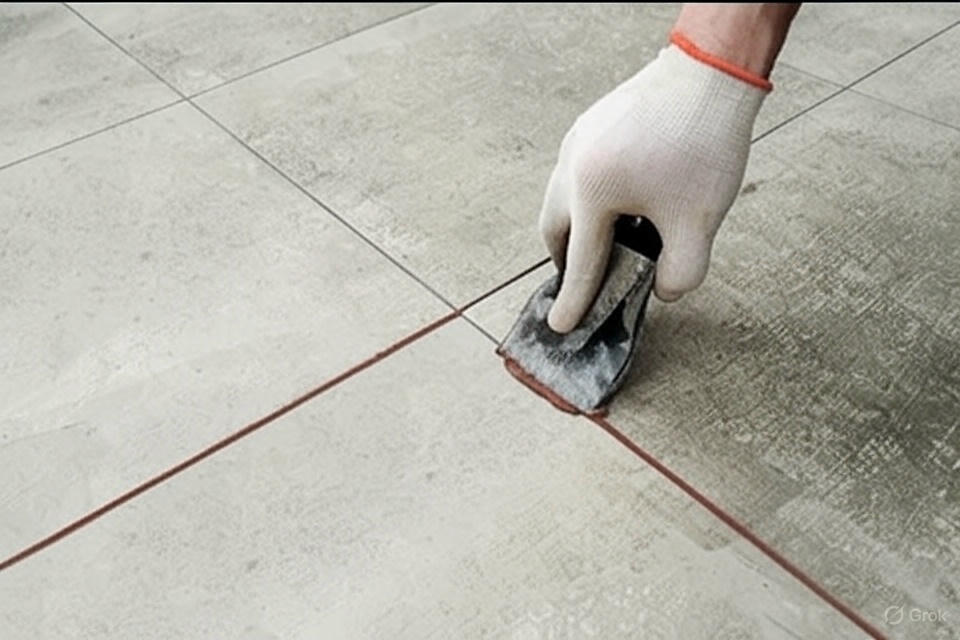
Epoxy Best Tiles Flooring: A Complete Guide to Choosing the Right Option for Your Home or Office
When it comes to choosing the perfect flooring for your home or office, epoxy tile flooring is becoming a top choice for modern spaces. Known for its durability, sleek appearance, and easy maintenance, epoxy tiles offer a balance between aesthetics and functionality. Whether you're renovating a residential area or upgrading a commercial space, understanding the pros and cons of epoxy tiles can help you make an informed decision.
In this complete guide, we’ll break down everything you need to know about epoxy tile flooring – from its benefits and drawbacks to installation, cost, and maintenance. Let’s dive in.
When it comes to durability and sleek design, Epoxy Tiles Flooring stands out as one of the most popular choices among homeowners and commercial property owners alike.
If you're considering epoxy flooring, it's also helpful to compare it with traditional tiles to see which suits your space better.What is Epoxy Tile Flooring?
Epoxy tile flooring is a type of floor covering made using a mixture of epoxy resin and hardeners, designed to create a durable, glossy, and seamless finish. Unlike traditional epoxy coatings that are poured directly onto concrete surfaces, epoxy tiles come pre-manufactured in square or rectangular shapes, making installation quicker and more uniform.
These tiles are especially popular in areas that require high resistance to stains, moisture, or heavy foot traffic. Epoxy tiles can be used in residential garages, commercial kitchens, showrooms, and even office lobbies. They combine the benefits of resin coating with the ease of tile installation.
Benefits of Epoxy Tile Flooring
Epoxy tile flooring is not just visually appealing — it offers a wide range of practical advantages:
✔️Durability
Epoxy tiles are incredibly durable and modern, making them ideal for both residential and commercial uses.
✔️Chemical Resistance
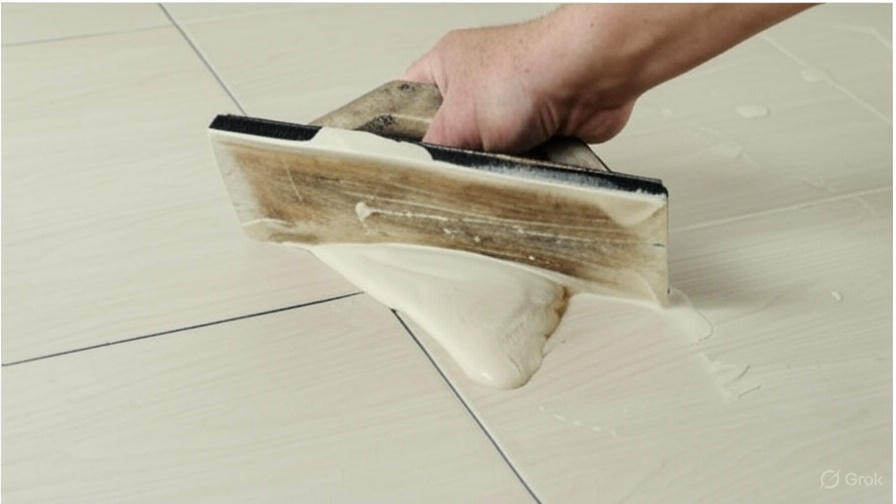
One of the standout benefits of epoxy is its ability to resist chemicals, oils, and stains. This makes it perfect for garages, laboratories, or areas prone to spills.
✔️Easy Maintenance
Epoxy tiles are non-porous, so they don’t absorb moisture or stains. A quick mop or wipe is usually enough to keep them clean and shiny.
✔️Sleek, Modern Appearance
The high-gloss finish of epoxy flooring gives any room a clean, polished, and professional look. They’re available in various colors and designs to match your décor.
✔️Moisture and Mold Resistant
Because epoxy is non-absorbent, it prevents moisture from seeping into the floor — a big advantage in humid areas or spaces prone to spills.
✔️Long Lifespan
With proper care, epoxy tile flooring can last 10–20 years or more, making it a cost-effective investment over time.
🧱 Types of Epoxy Tiles Flooring
Epoxy tiles come in various types based on design, texture, application, and material blend. Here are the most commonly used types:
1. Solid Color Epoxy Tiles
Description: Uniform, single-color epoxy tiles in shades like grey, white, blue, or beige.
Best for: Industrial, commercial, and minimalist residential designs.
Key Feature: Clean, professional, and modern appearance.
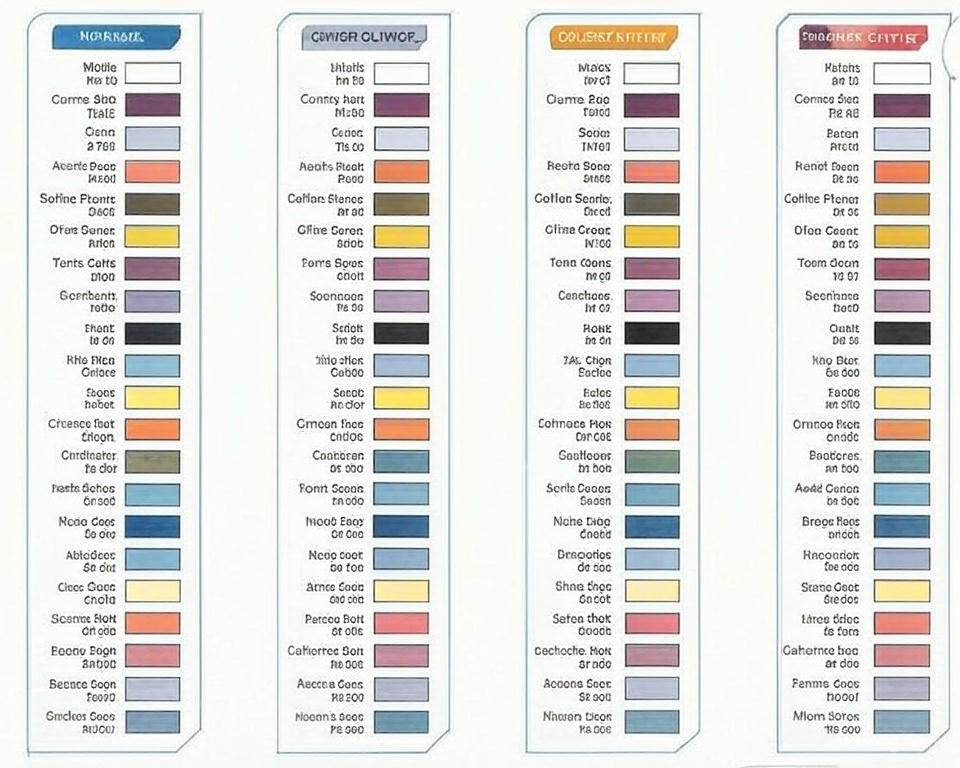
2. Metallic Epoxy Tiles
Description: These tiles have a metallic pigment mixed into the epoxy, creating a shimmering, marble-like effect.
Best for: Showrooms, lobbies, luxury homes, salons.
Key Feature: Elegant, high-end visual appeal.
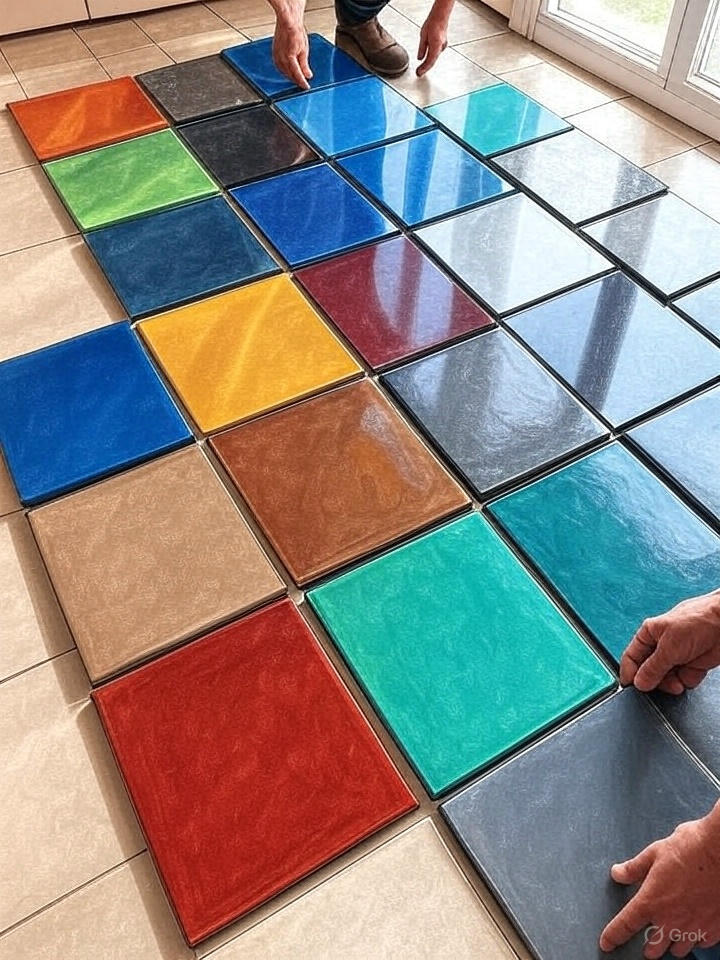
3. 3D Epoxy Tiles
Description: Printed or embedded images inside a clear epoxy layer to create realistic 3D effects (like ocean waves, stones, flowers).
Best for: Living rooms, kids' rooms, designer spaces.
Key Feature: Immersive and artistic flooring.
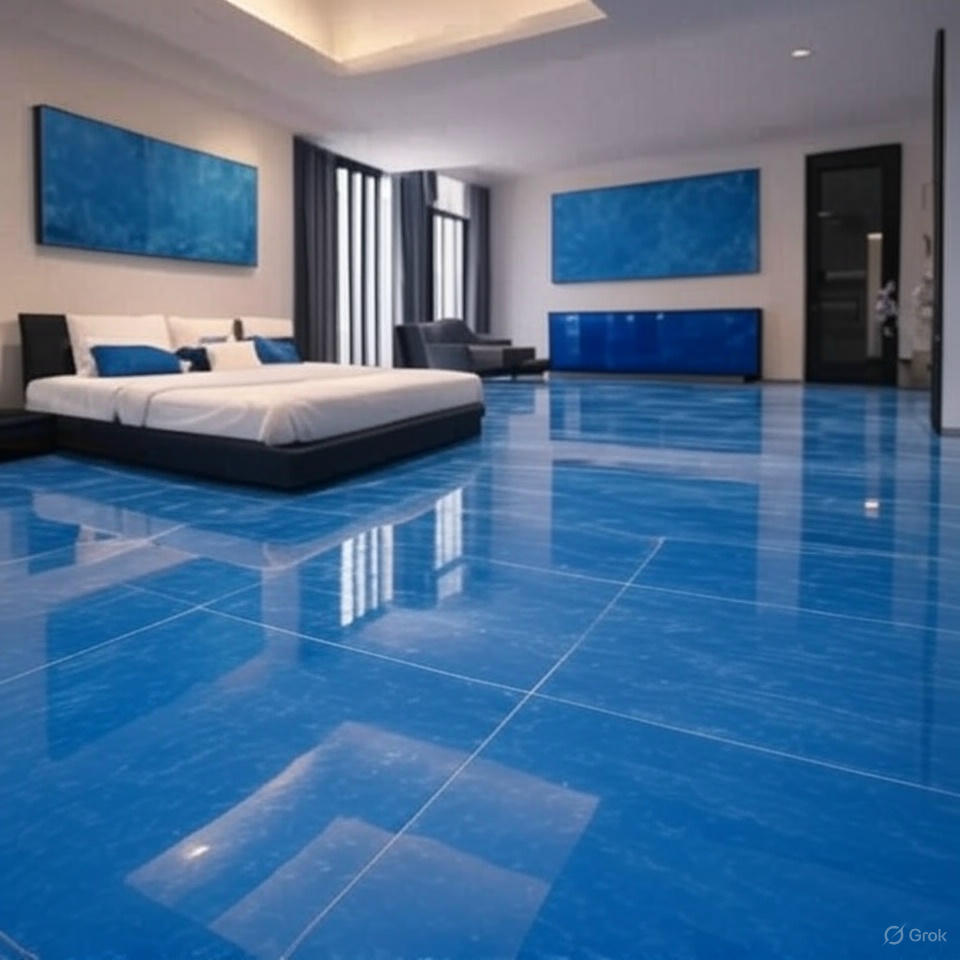
4. Quartz-Filled Epoxy Tiles
Description: Epoxy mixed with quartz sand or aggregate for extra strength and texture.
Best for: High-traffic or slip-prone areas like commercial kitchens or hospitals.
Key Feature: Slip-resistant and highly durable.
5. Flake Epoxy Tiles
Description: Decorative vinyl flakes or chips are embedded into epoxy, giving a textured, speckled look.
Best for: Garages, basements, retail spaces.
Key Feature: Hides dirt and imperfections well.
6. Self-Dispersing Epoxy Tiles
Description: Reinforced with quartz sand to withstand heavy traffic and mechanical loads.
Best for: Warehouses, factories, and high-impact zones.
Key Feature: Ultra-durable and skid-resistant.
7. Antistatic Epoxy Tiles
Description: Special tiles designed to prevent static electricity buildup.
Best for: Laboratories, data centers, electronics manufacturing.
Key Feature: Static control and safety in sensitive environments.
8. Terrazzo Epoxy Tiles
Description: Epoxy combined with marble, glass, or granite chips for a decorative terrazzo look.
Best for: Hotels, airports, and designer interiors.
Key Feature: Luxurious and timeless design.
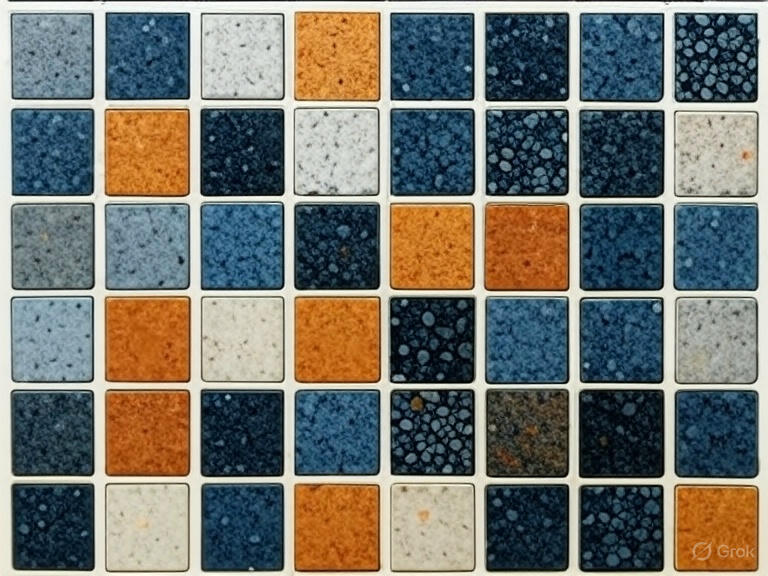
📍 Where Can You Use Epoxy Tiles?
Epoxy tile flooring is incredibly versatile and suitable for various environments due to its durability and design flexibility. Here are some ideal areas for installation:
🏠 Residential Garages
Epoxy tiles are durable and stain-resistant, making them perfect for garages where vehicles and tools are stored.
🍳 Kitchens & Bathrooms
Waterproof and easy to clean, epoxy tiles are ideal for moisture-prone areas like kitchens and bathrooms.
🏢 Offices & Reception Areas
Epoxy provides a sleek
🔧 Installation and Cost Overview
Installing epoxy tile flooring involves a few critical steps to ensure durability and a flawless finish. Here’s how the process typically works:
- Surface Preparation: The existing floor is cleaned, leveled, and dried thoroughly. This step is crucial for proper tile adhesion.
- Tile Placement: Epoxy tiles are arranged and installed using suitable adhesives. Precision in spacing and alignment is essential for a seamless look.
- Finishing: An optional sealant or protective coating may be applied to enhance durability and maintain shine.
💰 Cost Estimate (2025)
| Type | Cost per sq. ft. (INR) |
|---|---|
| Basic epoxy tiles | ₹80–₹150 |
| Premium designs/textures | ₹200–₹300+ |
| Installation (labor) | ₹30–₹70 |
Total cost: This varies based on the area size, tile quality, and the condition of the existing surface. It’s advisable to get a site assessment for an accurate estimate.
Maintenance Tips
- Clean weekly with a soft mop and pH-neutral cleaner.
- Avoid abrasives and harsh chemicals.
- Use furniture pads to avoid scratches.
- Reseal every 3–5 years as needed.
Epoxy Tiles vs. Other Flooring Options
| Feature | Epoxy Tiles | Ceramic Tiles | Vinyl Flooring |
|---|---|---|---|
| Durability | ⭐⭐⭐⭐⭐ | ⭐⭐⭐⭐ | ⭐⭐⭐ |
| Water Resistance | ⭐⭐⭐⭐⭐ | ⭐⭐⭐⭐ | ⭐⭐⭐⭐ |
| Maintenance | ⭐⭐⭐⭐ | ⭐⭐⭐ | ⭐⭐⭐ |
| Appearance | Sleek & Glossy | Traditional Look | Matte/Glossy |
| Lifespan | 10–20 Years | 8–15 Years | 5–10 Years |
| Installation Cost | Medium | Medium | Low |
Final Thoughts
Epoxy tile flooring is more than just a stylish upgrade — it’s a long-term investment in durability, design, and low maintenance. Whether you're renovating your home, upgrading your office, or building a commercial space, epoxy tiles offer a perfect blend of strength, elegance, and versatility.
Epoxy flooring offers a seamless and glossy finish that not only looks modern but also performs under pressure. Whether you're upgrading a garage or modernizing a kitchen, epoxy flooring is a durable and low-maintenance option. Homeowners choose epoxy flooring for its resistance to stains, chemicals, and heavy traffic.
With professional installation and a wide range of options — from basic solid colors to luxurious terrazzo and 3D effects — epoxy tile flooring is a smart and future-ready choice for any modern space.